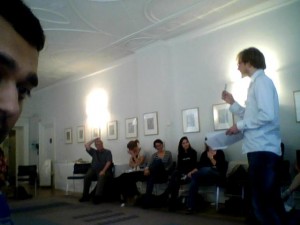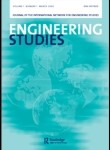 Dean and Donna are featured on the RPI website.
Dean and Donna are featured on the RPI website.
Moving into the cosmos… more perspectives
According to Caroline we are all in the messiness and confusion of a liminal space but certainty at different “places”.
Kaite got to direct an exercise sculpturing a human sculpture of liminality using conference delegates.
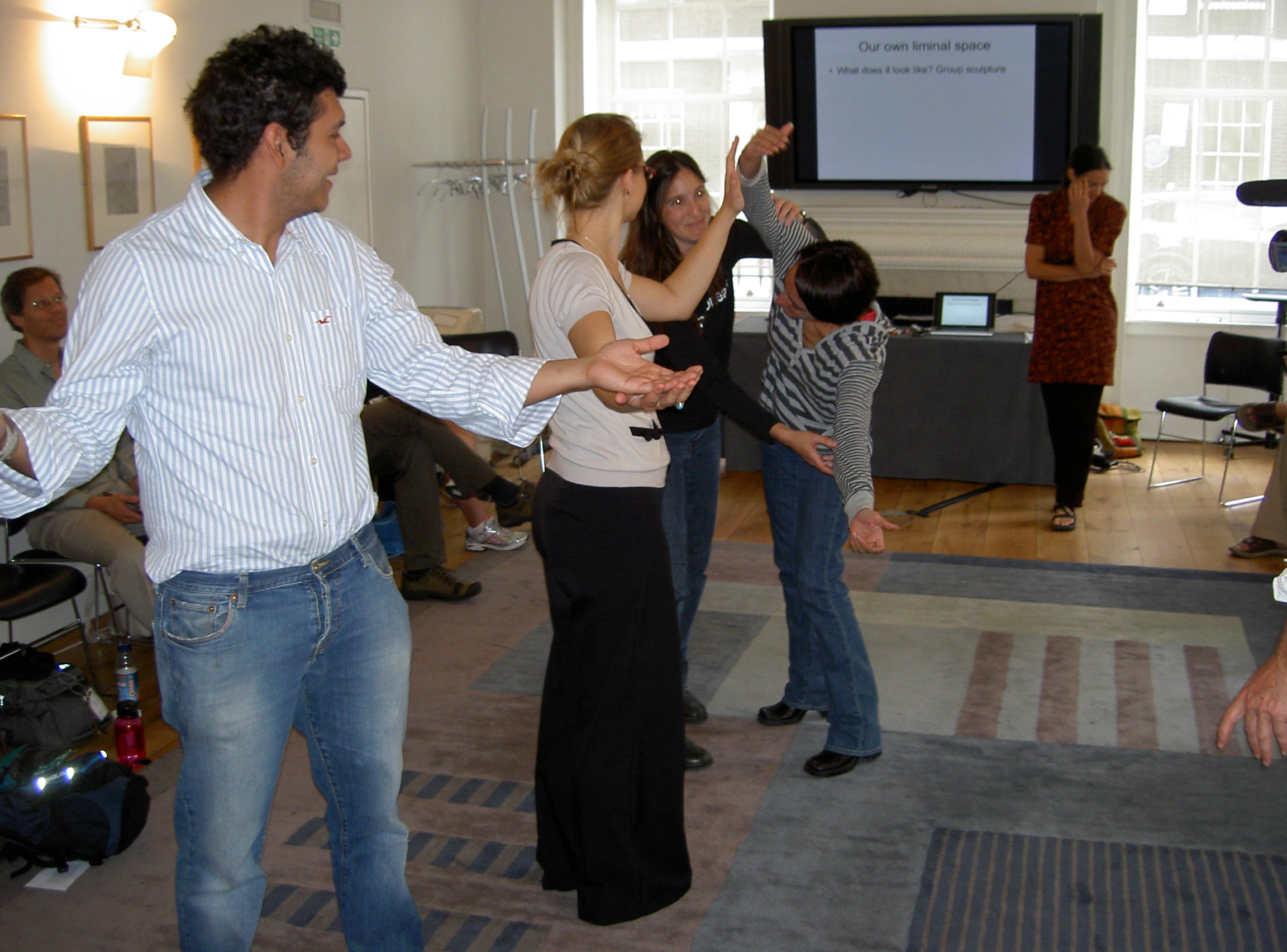
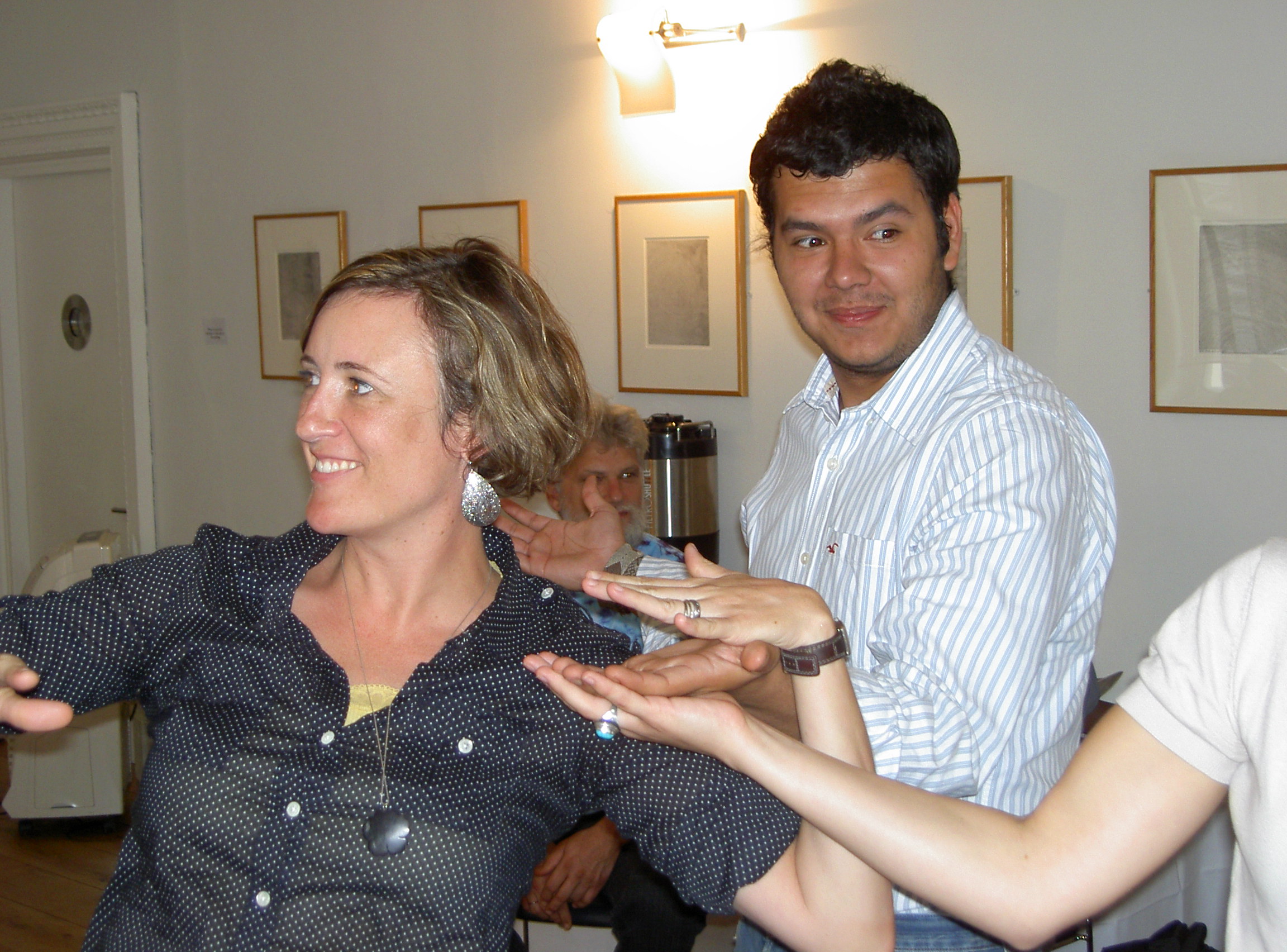
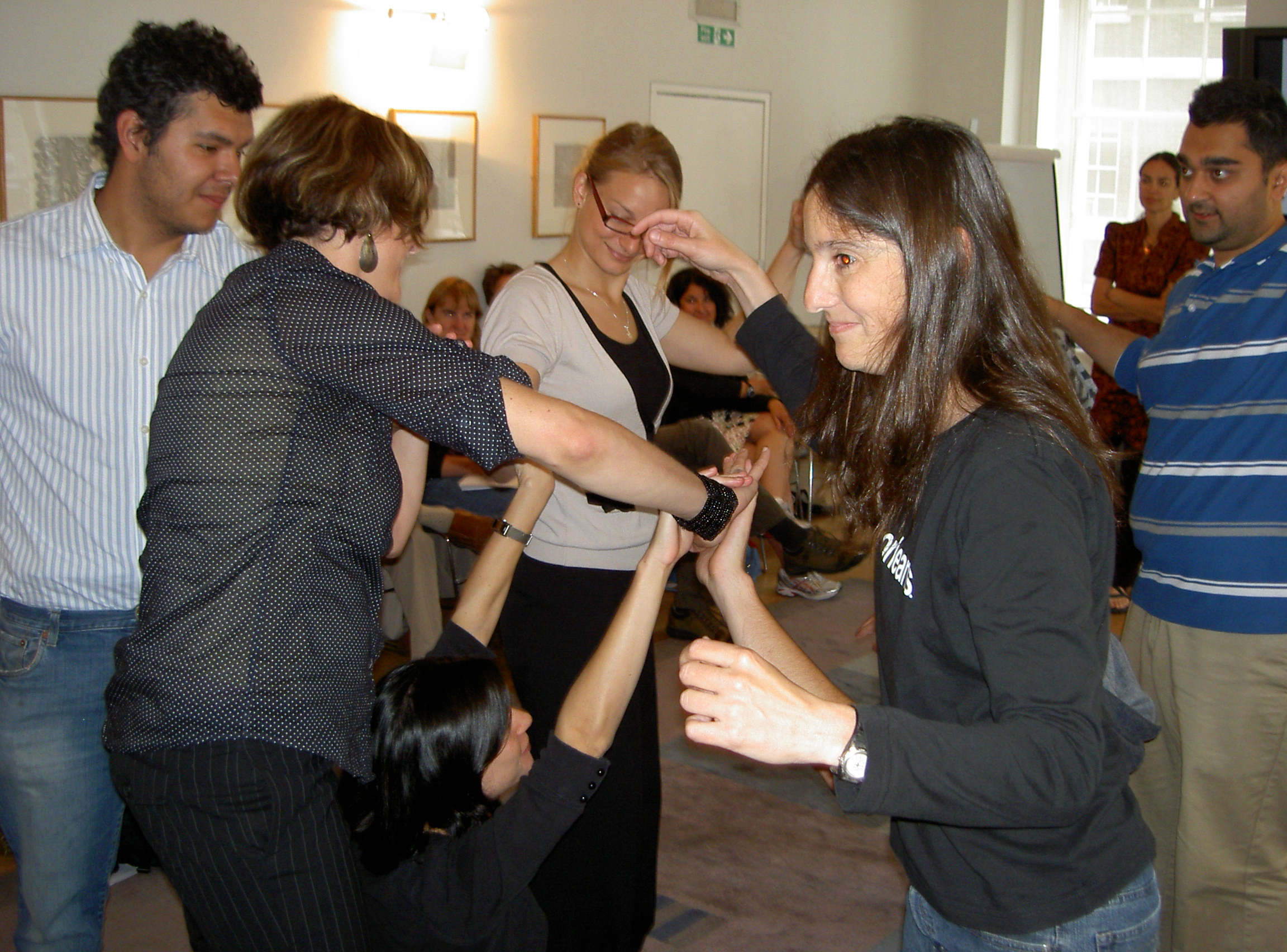
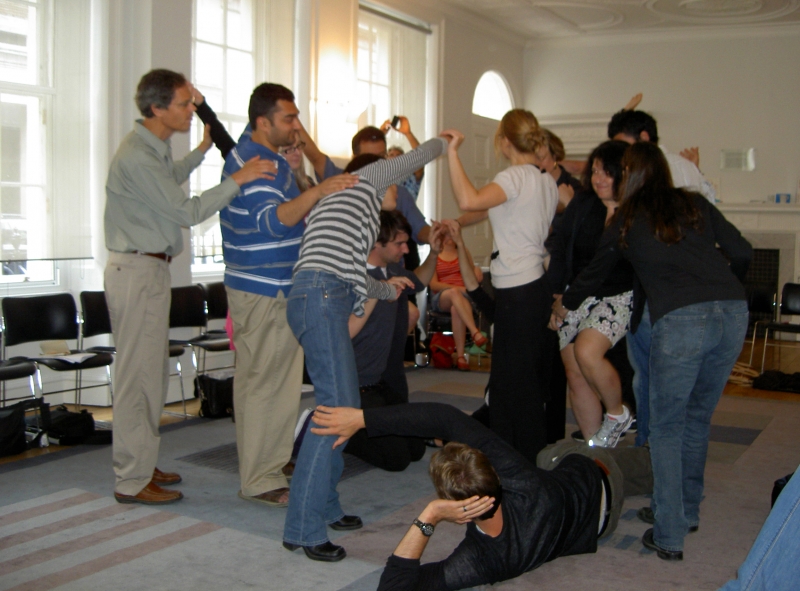
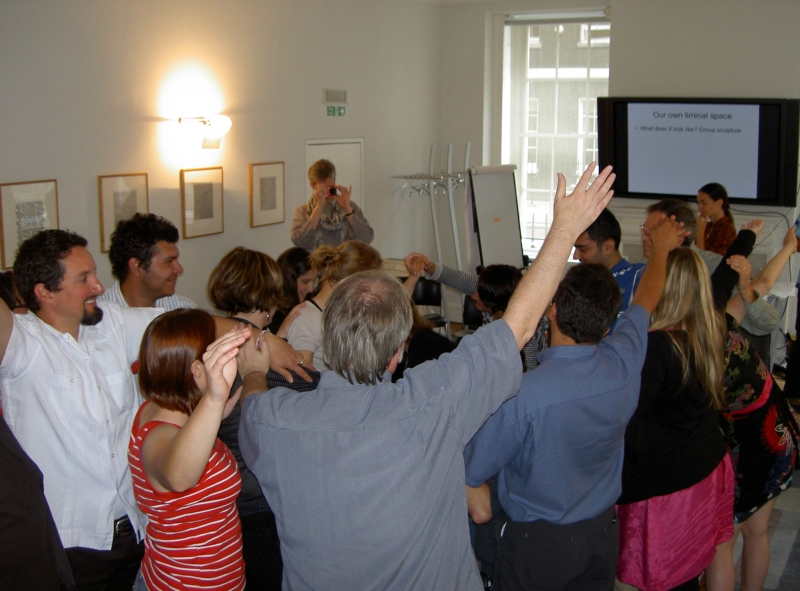
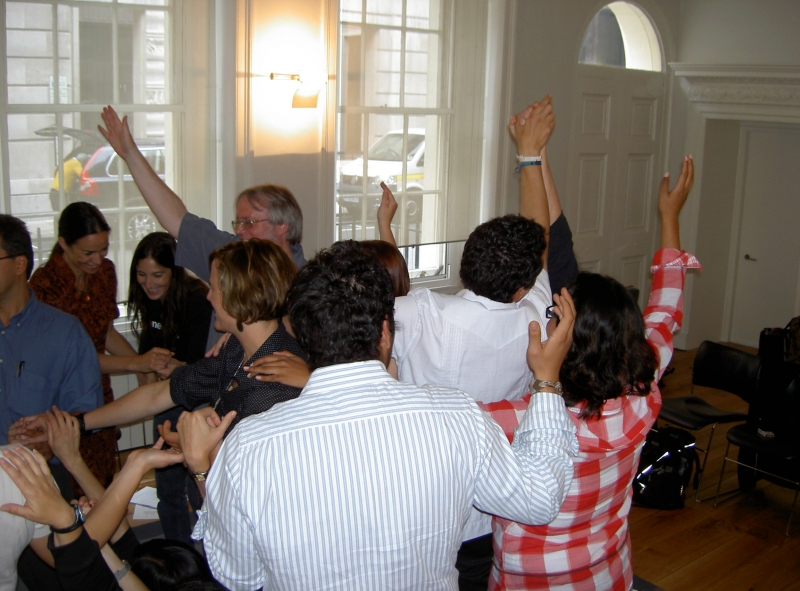
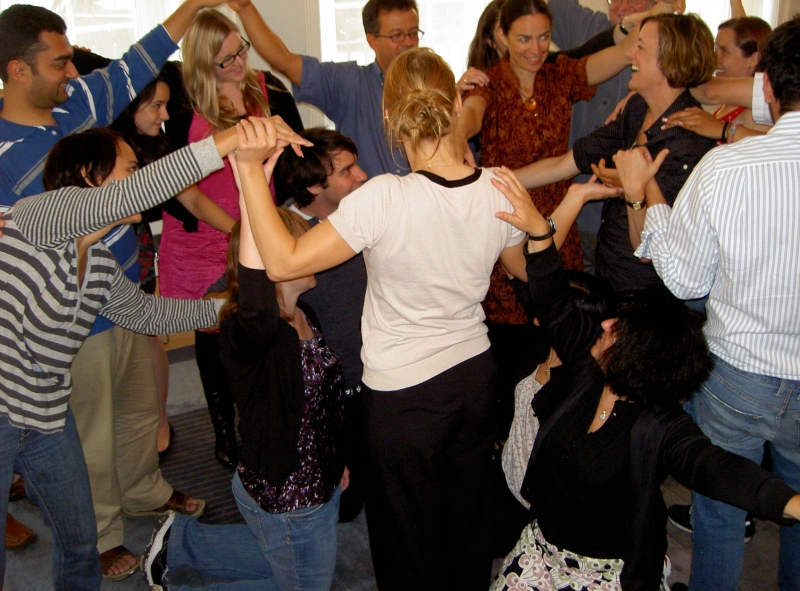
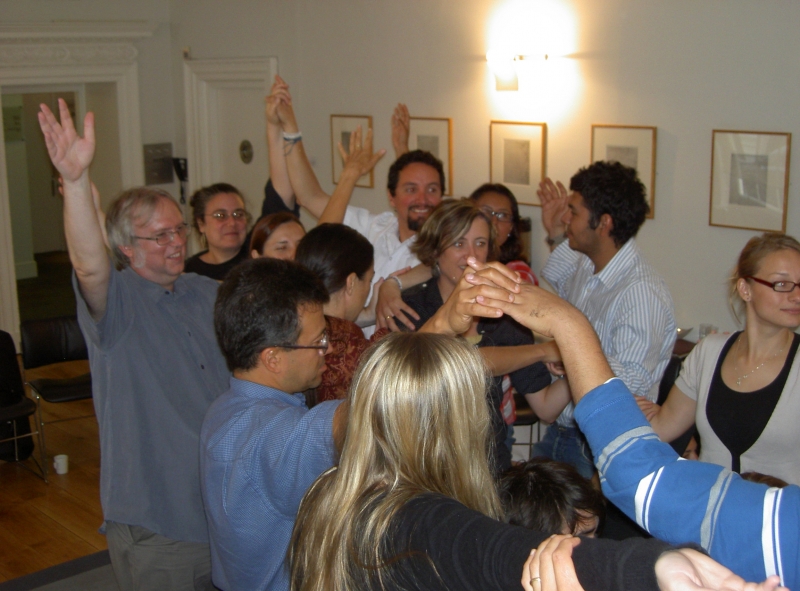
Some feedback on exp:
Lizzie: Connected in diff ways
Jen: See people hurting and wanted to help.
Donna: stretched outside my comfort zone.
Dani: People started to lean on each other.
Dean: Not used to be in this closeness space with strangers.
Juan: Strangers?
Darlko: A crowded city bus…
Heather: When on outside would I be picked, how will it be?
Lizzie: Katie got more confortanle in how she engaged.
Katie: I knew immediately that I wanted everyone. …. You can think of it in terms of your learning (e.g. PhD), connections
Caroline: a technique which gives a way of embodiment. Drawing on Boal’s Theatre of the oppressed.
Then we watched a TED talk about hoe to build a movement in 3 minutes. The first follower is the one who transforms a lone nut to a leader. The second follower makes a crowd. Three more now we have a movement. As the group grows the others will join to not be left out. Leadership is over glorified. Really the first follower that changed the lone nut in to a leader and then the movement. So dare to be a follower and change/build a movement.
Reflections form the critical friend’s talks.
Kaite and Juan: Exclusion of business….
Carolien we will come back to that.
Doug and Darko: actually we didn’t talk about goals. … Part of what we (education) is preparing the future business leaders. …
Lilly and Astrid: We have different perspectives on “working with communities” for example ownership of projects.
Jen and Dani: Been given a lot of think about and where I (Dani) will fit into the ESJP space.
Deborah and Dean: (On Dean) Collaboration on research collaboration as part of working as a community.
Kaite and Usamn …
Heather and Andrew: Learning experience…
Jen: The balance of risk and joy. For me this meeting have been about risk of “….” and joy of community.
Lizzie: The critical friends helped me reflect. Did not anticipate this.
Caroline: Donna had a good summary of the problematic with business.
Donna: Actually Dean.. The importance of understanding oppression.
Dean: The difference between people situated in industry and representing industry
Caroline: No one has said that certain people are not welcome, people choose this themselves. … But there need to be a space to have a discussion about ESJP without being told to shut up. ….
Eric: referring to groups in the 60s who got together around certain issues. And ESJP as a group needed a space to formulate what we are about as we are quite defined by academic and business and we need a bit more time to find this. Also important to keep some homogeneousness in terms of the questions we work with.
…
Dean: It’s about being critical about the institutions, the structures which lead to outcomes we don’t want, business, academic are parts of this.
Andres: reflecting on the diversity of the group of people attending this conference…
Caroline: … Everyone is welcome who is interested in doing engineering which is social just, but not people who support structures which have been proven to cause injustice. … The kind of critical reflection involved is difficult and uncomfortable.
On to ongoing activities and where we (as a community) are going.
…
Caroline: … It’s OK to be anti-everything except anti-capitalist…
….
Exercise: What are the ideal final results for our community?
Usman’s exercise about unpacking privilege
Some examples of privileges enjoined by the group:
Jen referring how she as a white person has the privilege to not to have to think about double-consciousness (in terms of race, but maybe not in terms of gender).
Dani talked about being born in Australia and thus is a native English which makes (academic) life easier.
Juan reflected on how we didn’t start with the “classical” sociological categories race, class, gender etc. but then how quickly one arrives as these when one starts to deconstruct. And then he gave an example of a society where privilege was understood in terms of where on lived as the village was situated on a hill and human waste would find its way down the hill, so the higher up the better.
Andres spoke of being born in Colombia and having access to the Anglo-Saxon world.
Heather spoke of the privilege o being able to go to university.
Jon spoke how being able to speak English give us the privilege to be at this conference. Him and I (Jens) also spoke o the privilege of comfortably belonging to shared norms in for example mass media.
Usman also challenged the myth of I’ve worked hard and thus I deserve what I got (my privileges).
Usamn then shoved a video clip from a talk with Tim Wise.
Peter shared his story how he could be here at the conf here today. Two working parents which allowed for university studies … met Caroline … dad works in Africa so frequent flyer miles to spare ad thus Peter could come here to London…
Usamn then rounded off the session with some perspectives on racism (from zine Fire it up, light a match) and the role of being an ally.
Some reflections from the check-in on Friday morning
I could not capture what everyone said…
Andres: I love this community. So much energy.
Dani: Get so much more out of this conf than others.
Lizzie: Want to work with Oz faculty about incorporating SJ themes.
Juan: I have invited Lizzie to come Colorado and talk to us. Also exited about this exercise about privilege.
Jen: Exited about all the interesting people.
Jon: Grateful, I’ve learned so much in these days. Sad when it will be over.
Mathew: Feeling practical. Wondering how themes from conversations here can be integrated to the wider engineering stream.
Dean: Not looking forward to going back and plug in the normal academic routine. This is the best conference.
Caroline: Sad to see all my friends going. Hopeful to see what we can do at a distance. Exited about that we are doing this exercise.
Moving into the cosmos…
According to Caroline we are all in the messiness and confusion of a liminal space but certainty at different “places”.
Kaite got to direct an exercise sculpturing a human sculpture of liminality using conference delegates.
Some feedback on exp:
Lizzie: Connected in diff ways
Jen: See people hurting and wanted to help.
Donna: stretched outside my comfort zone.
Dani: People started to lean on each other.
Dean: Not used to be in this closeness space with strangers.
Juan: Strangers?
Darlko: A crowded city bus..
Heather: When on outside woill I be picked how will it be.
Lizzie: Kate got more confortanle in how shw engafged.
Kate: I knew immediately that I wanted everyone. …. You can think of it in terms of your learning (e.g. PhD), connections
Caroline: a technique which gives a way of embodiment. Drawing on Boal’s Theatre of the oppressed.
Then we watched a TED talk about hoe to build a movement in 3 minutes. The first follower is the one who transforms a lone nut to a leader. The second follower makes a crowd. Three more now we have a movement. As the group grows the others will join to not be left out. Leadership is over glorified. Really the first follower that changed the lone nut in to a leader and then the movement. So dare to be a follower and change/build a movement.
Reflections form the critical friend’s talks.
Kaite and Juan: Exclusion of business….
Carolien we will come back to that.
Doug and Darko: actually we didn’t talk about goals. … Part of what we (education) is preparing the future business leaders. … Lilly and Astrid: We have different perspectives on “working with communities” for example ownership of projects.
Jen and Dani: Been given a lot of think about and where I (Dani) will fit into the ESJP space.
Deborah and Dean: (On Dean) Collaboration on research collaboration as part of working as a community.
Kaite and Usamn …
Heather and Andrew: Learning experience…
Jen: The balance of risk and joy. For me this meeting have been about risk of “….” and joy of community.
Lizzie: The critical friends helped me reflect. Did not anticipate this.
Caroline: Donna had a good summary of the problematic with business.
Donna: Actually Dean.. The importance of understanding oppression.
Dean: The difference between people situated in industry and representing industry
Caroline: No one has said that certain people are not welcome, people choose this themselves. … But there need to be a space to have a discussion about ESJP without being told to shut up. ….
Eric: referring to groups in the 60s who got together around certain issues. And ESJP as a group needed a space to formulate what we are about as we are quite defined by academic and business and we need a bit more time to find this. Also important to keep some homogeneousness in terms of the questions we work with.
…
Dean: It’s about being critical about the institutions, the structures which lead to outcomes we don’t want, business, academic are parts of this.
Andres: reflecting on the diversity of the group of people attending this conference…
Caroline: … Everyone is welcome who is interested in doing engineering which is social just, but not people who support structures which have been proven to cause injustice. … The kind of critical reflection involved is difficult and uncomfortable.
On to ongoing activities and where we (as a community) are going. … Caroline: … It’s OK to be anti-everything except anti-capitalist… ….
Exercise: What are the ideal final results for our community?
Usman’s exercise about unpacking privilege
Some examples of privileges enjoined by the group:
Jen referring how she as a white person has the privilege to not to have to think about double-consciousness (in terms of race, but maybe not in terms of gender).
Dani talked about being born in Australia and thus is a native English which makes (academic) life easier.
Juan reflected on how we didn’t start with the “classical” sociological categories race, class, gender etc. but then how quickly one arrives as these when one starts to deconstruct. And then he gave an example of a society where privilege was understood in terms of where on lived as the village was situated on a hill and human waste would find its way down the hill, so the higher up the better.
Andres spoke of being born in Colombia and having access to the Anglo-Saxon world.
Heather spoke of the privilege o being able to go to university.
Jon spoke how being able to speak English give us the privilege to be at this conference. Him and I (Jens) also spoke o the privilege of comfortably belonging to shared norms in for example mass media.
Usman also challenged the myth of I’ve worked hard and thus I deserve what I got (my privileges).
Usamn then shoved a video clip from a talk with Tim Wise.
Peter shared his story how he could be here at the conf here today. Two working parents which allowed for university studies … met Caroline … dad works in Africa so frequent flyer miles to spare ad thus Peter could come here to London…
Usamn then rounded off the session with some perspectives on racism (from zine Fire it up, light a match) and the role of being an ally.
Some reflections from the check-in on Friday morning (I could not capture what everyone said.)
Andres: I love this community. So much energy. Dani: Get so much more out of this conf than others. Lizzie: Want to work with Oz faculty about incorporating SJ themes. Juan: I have invited Lizzie to come Colorado and talk to us. Also exited about this exercise about privilege. Jen: Exited about all the interesting people. Jon: Grateful, I’ve learned so much in these days. Sad when it will be over. Mathew: Feeling practical. Wondering how themes from conversations here can be integrated to the wider engineering stream. Dean: Not looking forward to going back and plug in the normal academic routine. This is the best conference. Caroline: Sad to see all my friends going. Hopeful to see what we can do at a distance. Exited about that we are doing this exercise.
Usman speaking about racism…
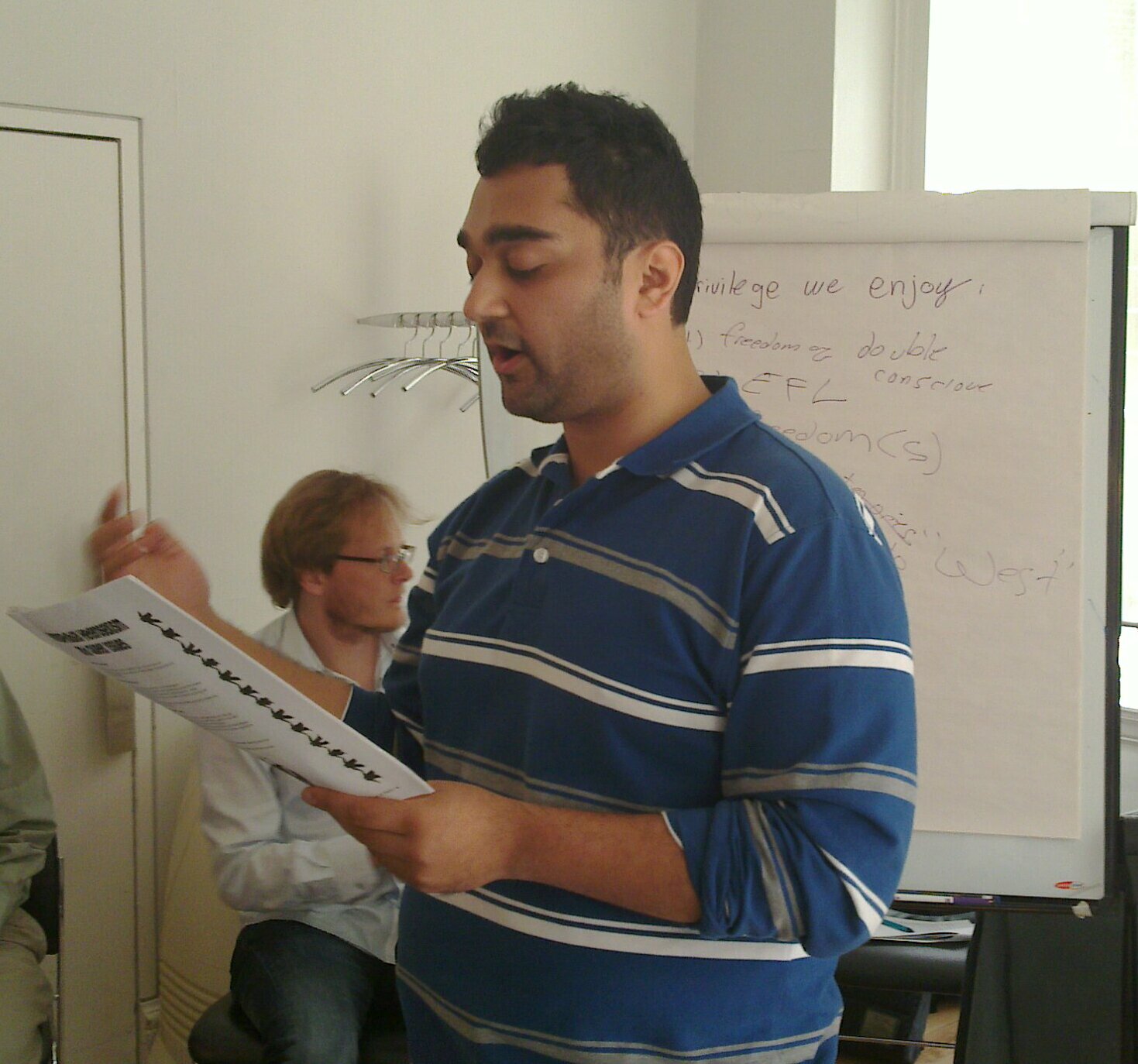
Moving into the cosmos
Caroline led us in thinking about us as a “movement”. She asked Katy to create a liminal space out of the people at the conference to represent what she felt about ESJP. This resulted in the next 10 or so minutes with Katy silently arranging people to create a “living sculpture”. Caroline then invited attendees to share their feelings on what it felt to be included in the space and not included in that space. This was a technique from the “theatre of the oppressed” as theorized by Boal.
ESJP as a movement:
Then the conference participants were encouraged to go talk to their critical friend about goals for this conference. Katy cited the lack of industry partners as a point of concern, while others felt that their goal of learning more was very much reached as there was lots of information to process. My critical partner had the goal of rejuvenating during the conference by meeting old and new friends, which she did meet during the conference. Dean was interested in contributing to the sustainability of the ESJP community during the conference. Lizzie felt that she had several critical conference friends and they contributed greatly to her thinking.
Caroline pointed to Donna to address the critique of industry partners being absent. Donna said that “During this conference, many forms of oppression were put on the table like racism. It doesn’t mean white people aren’t welcome, it just means they have to acknowledge racism and deal with it. In the same way, capitalism is a form of oppression. Folks from industry are welcome as long as they are willing to critique capitalism”.
Caroline says that ESJP must allow those who are members of this “community” or “movement” to critical engage with dominant discourses in engineering and challenge the “business as usual” model in the engineering world. Dean added that it’s not just being critical of the corporate world but also critical of dominant institutions and structures.
Caroline addressed the issue of tension between newcomers to the social justice space and those who have more experience with it. Then she talked about ongoing activities in the ESJP network:
- PAR Research – Dean’s PAR project
- Book series
- Workshops
- Zine
- Online modules
- Next Conference
Q&A for Session 2 (Juan and Jen’s presentations)
Doug: The engineers have supplied to the business community a reason for reducing smoke in their own terms. But it doesn’t actually deal with the exploitive nature of those businesses. You shouldn’t reduce smoke just because it makes business sense.
Peter: The business case solution doesn’t provide a long-term solution. But we should ask ourselves if it works towards justice right now? It’s not a great long-term or complete solution, but it works towards that goal.
Jen: There’s a tension in the case of Rico between the community and the greater community of those who will be supplied with the electricity.
Donna: Energy deregulation in the US has caused many problems. You have deregulation without competition so energy is very expensive and controlled by monopolies.
Jen: Rico is not a wealth community so they could not run a energy coop like some other communities in Colorado.
Lily: I’m from Engineers against Poverty and we work to make the “business case” in the developing world because we think it’s important.
Arias: I’d love to see more of these histories but I think engineers sometimes concentrate too much on the technical fix and not enough in defining the problem.
Darko: I think we need to make the business case because they won’t change unless you force them to by showing that they can’t afford to.
Jon: I feel that one theme running in all these comments is the “triple bottom line” (social, environmental, economic). In some case studies, one or more of these factors are considered more than others.
Caroline: I think we’ve spent too much time thinking of the economic factor. We, as a community, need to be more worried about the social and environmental. Then maybe….maybe….we can talk about economics. We need to actually critique this economic factor much more. I want to smash the triple bottom line because it’s not easy equal categories. It’s more a muddle.

